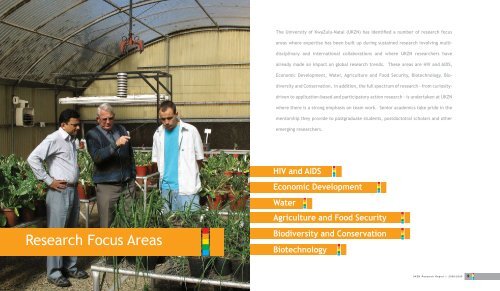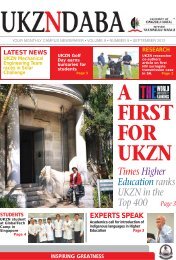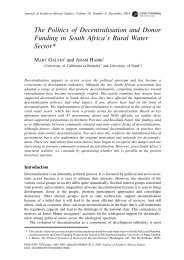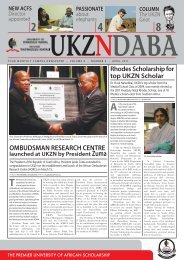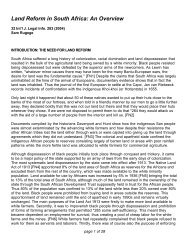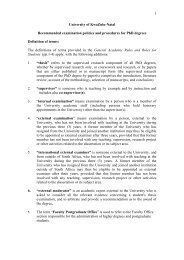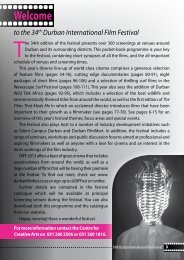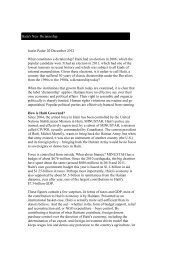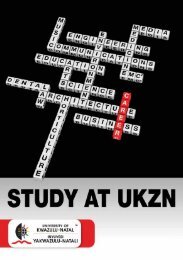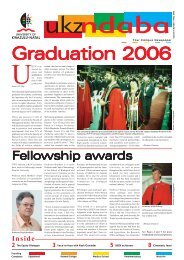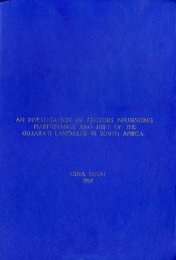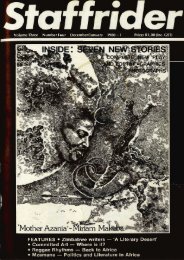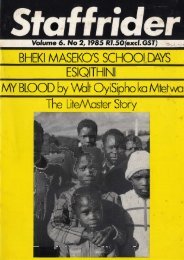universit y of kw azulu-na tal research repor t 2008/2009 - UKZN ...
universit y of kw azulu-na tal research repor t 2008/2009 - UKZN ...
universit y of kw azulu-na tal research repor t 2008/2009 - UKZN ...
- No tags were found...
Create successful ePaper yourself
Turn your PDF publications into a flip-book with our unique Google optimized e-Paper software.
Pr<strong>of</strong>essor Nelson IjumbaDeputy Vice-Chancellor: ResearchPr<strong>of</strong>essor Cheryl PotgieterUniversity Dean <strong>of</strong> ResearchA Research-led UniversityIIn <strong>2008</strong>/9 the University <strong>of</strong> KwaZulu-Na<strong>tal</strong> (<strong>UKZN</strong>) continued to be trueIto its mission <strong>of</strong> being a <strong>research</strong>-led <strong>universit</strong>y. There was a notableIincrease in <strong>research</strong> productivity as well as the number <strong>of</strong> <strong>research</strong>ersIbeing recognised <strong>na</strong>tio<strong>na</strong>lly and inter<strong>na</strong>tio<strong>na</strong>lly for their excellence.IIn <strong>2008</strong>, the publications units credited by the Department <strong>of</strong> HigherEducation and Training increased by 12 percent to 977.45, from the 2007figure, making it the third highest in the country. The weighted outputper staff member increased to 95 percent <strong>of</strong> the norm, compared to 80percent in 2007. In <strong>2009</strong>, the <strong>research</strong> publications output increasedto 1108.20 (13 percent) units and the weighted output per staff to 112percent <strong>of</strong> the norm, which was an 18 percent increase over the <strong>2008</strong>level. The proportion <strong>of</strong> <strong>research</strong> active staff increased from 69 percentto 75 percent (<strong>2009</strong>), while the proportion <strong>of</strong> staff with doctoratesincreased from 39 percent (<strong>2008</strong>) to 40 percent (<strong>2009</strong>). Accordingto the Academic Ranking <strong>of</strong> World <strong>of</strong> Universities (ARWU) system, in<strong>2009</strong>, <strong>UKZN</strong> improved its position in the top 500 <strong>universit</strong>ies.The number <strong>of</strong> <strong>research</strong>ers with NRF rating increased from 137 in2007 to 144 in <strong>2008</strong> and 156 in <strong>2009</strong>. About 15 percent <strong>of</strong> the rated<strong>research</strong>ers were Black in <strong>2008</strong> and 13 percent in <strong>2009</strong>. Femalesconstituted about 27 percent <strong>of</strong> the rated <strong>research</strong>ers in <strong>2009</strong>, comparedto 23 percent in <strong>2008</strong>. Of the rated <strong>research</strong>ers in <strong>2008</strong>/9, the followinghad the prestigious A-rating: Pr<strong>of</strong>essor Michael Chapman (School <strong>of</strong>Literary Studies, Media and Creative Arts), Pr<strong>of</strong>essor Patricia Berjak(School <strong>of</strong> Biological and Conservation Sciences), Pr<strong>of</strong>essor Rob Gous(School <strong>of</strong> Agriscience and Agribusiness), Pr<strong>of</strong>essor Michael Henning(School <strong>of</strong> Mathematical Sciences) and Pr<strong>of</strong>essor Steve Johnson(School <strong>of</strong> Biological and Conservation Sciences). In <strong>2008</strong>, Pr<strong>of</strong>essorSerban Proches from the School <strong>of</strong> Environmen<strong>tal</strong> Sciences wasawarded the P-rating, for his outstanding work as a young scientist.Programmes have been put in place by the Research Office to improvethe institutio<strong>na</strong>l participation in the NRF rating system as well asincrease the number <strong>of</strong> Female and Black rated <strong>research</strong>ers.<strong>UKZN</strong> continues to maintain its links with retired and other exter<strong>na</strong>l<strong>research</strong> active staff through Senior Research Associates (SRAs)and Honorary Research Fellow (HRFs) appointments. By the end <strong>of</strong><strong>2009</strong> there were 35 SRAs and 36 HRFs contributing actively to theinstitutio<strong>na</strong>l <strong>research</strong> productivity.In <strong>2009</strong>, Pr<strong>of</strong>essor Julian May was appointed NRF SARChI Chairfor Applied Poverty Reduction Assessment. This brought to eight thenumber <strong>of</strong> SARChI Chairs at <strong>UKZN</strong>, one <strong>of</strong> them being female. Duringthe period <strong>of</strong> review, a number <strong>of</strong> our <strong>research</strong>ers were recognisedand honoured for their excellent and significant contributions in theirrespective areas <strong>of</strong> expertise. Pr<strong>of</strong>essor An<strong>na</strong> Coutsoudis received the<strong>2009</strong> Academy <strong>of</strong> Science <strong>of</strong> South Africa (Assaf) Gold Medal for heroutstanding <strong>research</strong> on public health issues for children in SouthernAfrica and other HIV endemic regions in the world. Pr<strong>of</strong>essor SalimAbdool Karim received the prestigious Prize for Medical Sciencefrom the Third World Academy <strong>of</strong> Sciences for his exceptio<strong>na</strong>l anddistinguished contribution to public health and medicine, especiallyin HIV prevention and treatment. The Vice-Chancellor, Pr<strong>of</strong>essorMalegapuru Makgoba was elected to the Scientific Advisory Board <strong>of</strong>the Mymetics Corporation <strong>of</strong> Switzerland, a biotechnology companyfocussing on the development <strong>of</strong> the next generation <strong>of</strong> preventivevaccines. Ms Celia Snyman won the “Fellowship for Women Scientists”in the South African Women in Science Awards <strong>of</strong> the Department <strong>of</strong>Science and Technology.4 <strong>UKZN</strong> Research Report // <strong>2008</strong>/<strong>2009</strong> <strong>UKZN</strong> Research Report // <strong>2008</strong>/<strong>2009</strong> 5


